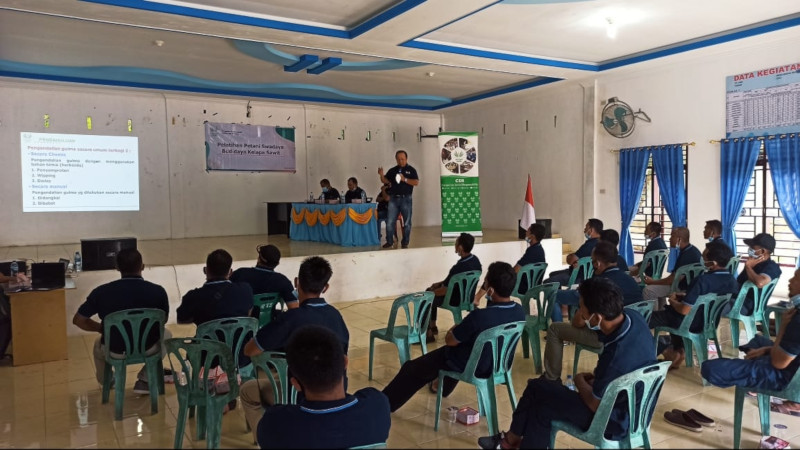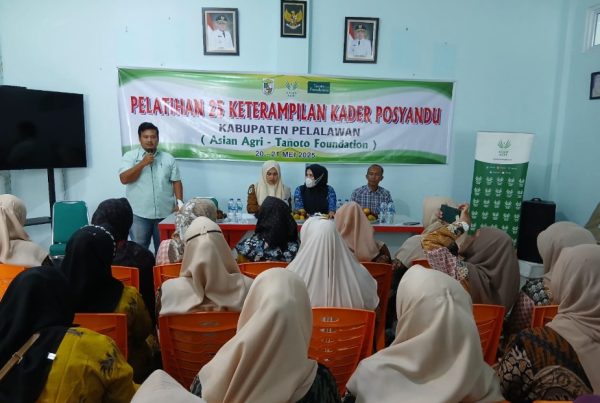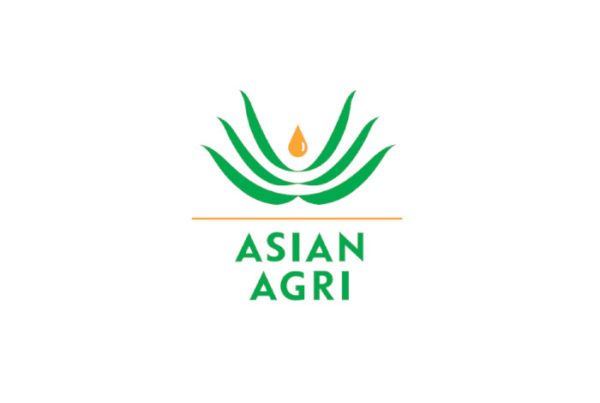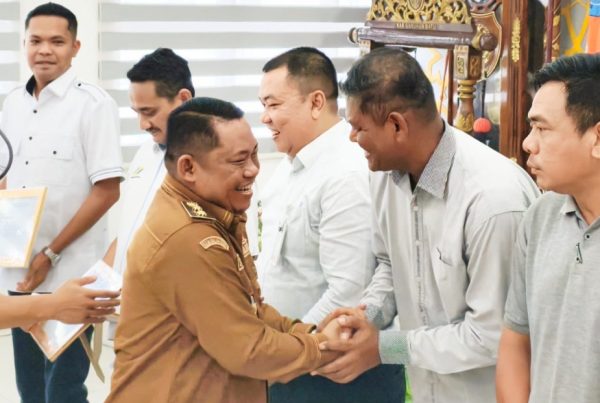Rantauprapat, 8 July 2021 –Asian Agri’s subsidiary PT Supra Matra Abadi (PT SMA) Aek Nabara Plantation conducted training on oil palm cultivation for smallholders in Rintis Village, Silangkitang District, Labuhan Batu Selatan Regency on 30 June 2021.
This activity was held with limited visitors in compliance with safe distancing protocol. The few attendees included Silangkitang Subdistrict Head, Makmur Karim S.Pd.I, M.Pd.I, PPL officers from the Suharto Agriculture Office, Village Head of Rintis Village, Sugianto, along with Rintis Village officials.
This oil palm cultivation training for independent smallholders is one of the many Corporate Social Responsibility (CSR) programs of PT SMA Kebun Aek Nabara. This training focused on two key areas in oil palm cultivation, namely weed control and proper fertilization of the oil palm. The two courses were respectively conducted by Senior Manager PT SMA, Armstrong Sihombing CSV Assistant, Rifky Anandika.

Armstrong Sihombing said that oil palm production is determined by many factors, such as the type of seeds planted, good maintenance including weed control, pest and disease prevention, shoots, road repairs, fertilization and others.
According to Mr. Armstrong, 50% of the earnings from an oil palm plantation should be used for operational costs such as maintenance and fertilization so that the production of palm oil will remain optimal till the oil palm reaches 30 years.
“We should not destroy all the weeds in the plantation as some serve to naturally deter pests. That is why we just spray or clean on a 1.5 meter wide plate from the base of the tree, guided by the 4 principles: The right dose, the right place, the right way and the right time. Most oil palm farmers do not apply weed control appropriately, and this causes the cost of control per hectare to be very high. The right way to deal with the weeds is chemical (spray, wiping) or manual (tripe, jack). We must understand and identify the type of weed, so we use the appropriate herbicide,” explained Mr. Armstrong.
Rifky Anandika presented to participants on how to fertilize oil palm. The course delved into details such as the nutrient needs of oil palm, the symptoms of nutrient deficiency, the method and location of sowing.
“The main elements needed by oil palm plants are Nitrogen, Potassium, Phosphorus, Magnesium, and Boron. According to research, fertilization should be carried out in the garden above the empty stalks and above the midrib. Good fertilization is done according to the dose and needs per tree by making a calibrated dose. It would be best if the soil and leaves were analyzed beforehand, so that the dosage really matched the needs of oil palm,” explained Rifky.
The training was followed by a question and answer session, in which participants shared and received more insights into cultivating oil palm plantations. Village Head Rintis, Sugianto said that the oil palm cultivation training was crucial in increasing the agronomic knowledge for the independent smallholder community of Rintis Village
“This training has been a long time coming and it helps to boost our knowledge on good oil palm cultivation techniques. I am very grateful to PT SMA (Asian Agri) for taking the time and sharing this with the community, especially Rintis Village. Hopefully, more similar sessions can be organized for the wider community, so that the best practices can be implemented in across all estates,” said Mr. Sugianto.
The Head of Silangkitang Makmur Karim also expressed his gratitude to PT SMA (Asian Agri). He said: “I appreciate PT SMA (Asian Agri) for organizing this training, and hope it can greatly benefit the community. Improvements in our farmers’ knowledge can hopefully lead to improvement in oil palm yields. I also hope the 25 participants will be able to share their acquired knowledge with their neighbors so that the people of Rintis Village can prosper together.”
About Asian Agri:
Asian Agri is one of Indonesia’s largest palm oil producers. Founded in 1979, the company today manages 100,000 hectares of plantation land and employs over 25,000 people. A pioneer of the Indonesian government’s Trans-National Government Migration (PIR-Trans) program, Asian Agri currently works with 30,000 Plasma Scheme smallholders in Riau and Jambi who operate 60,000 hectares of palm oil plantations, and independent smallholders who manage a total 41,000 hectares.
Implementing a strict “no burn” policy since 1994 and best practices in sustainable plantation management, Asian Agri has helped its smallholder partners improve productivity, yield and supply chain traceability, while assisting them obtain certifications. The company’s mills are technologically advanced and energy self-sufficient, minimizing greenhouse gas emissions.
Asian Agri (PT Inti Indosawit Subur) is a member of the Roundtable on Sustainable Palm Oil (RSPO) since 2006. More than 86% of its owned plantations in North Sumatra, Riau & Jambi provinces and 100% of Plasma Scheme smallholder plantations in Riau & Jambi provinces have been RSPO certified. All its owned plantations and those owned by scheme smallholders ISCC (International Sustainability & Carbon Certification) certified since 2014. In 2019, the company also achieved 100% ISPO (Indonesian Sustainable Palm Oil) certification.
The company’s operations are ISO 14001 certified, while its Learning Institute and nursery research center in Riau province, Indonesia are both ISO 9001 certified. Asian Agri’s laboratory at the Center for Research and Development in Tebing Tinggi is accredited by the National Accreditation Committee under the ILAC Mutual Recognition Arrangement (ILAC MRA).
Lidya Veronica
Media Relations
E-mail: lidya_veronika@www.asianagri.com




